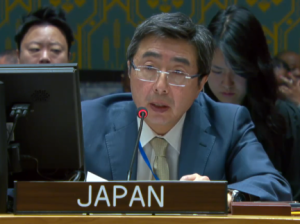国連安保理公開討論「平和と安全の維持:共通の開発を通じた持続的な平和の推進」における石兼大使ステートメント
令和5年11月20日

(as delivered)
Mr. President,
I thank Secretary-General Guterres, Mrs. Rousseff, and Professor Sachs for their remarks.
Achieving and maintaining sustainable peace and security requires not just a short-term response to violence or a humanitarian situation, but also medium- to long-term efforts to prevent the outbreak or recurrence of conflict. In this regard, a comprehensive and inclusive approach built on the Humanitarian-Development-Peace nexus is key.
There is no doubt that development is one of the foundational components of peace and security. People cannot feel secure when they have no means to sustain themselves. Providing necessary infrastructure and decent economic opportunities for all will help reduce grievances and lower the risks of social instability. At the same time, for peace and security to be truly sustainable, especially after conflict situations, it is imperative to build and nurture trust between people, community, and government in the development process.
Mr. President,
For people to have faith in their government, basic services such as health, education and security must be delivered to the public. Building resilient institutions through education and training is essential. The international community, therefore, should support countries’ efforts to build institutions based on the rule of law, which is the basis of good governance, and to invest in people, who are the cornerstone of governance.
All this takes us back to the principles of the UN Charter that all efforts should focus on “human dignity”. Yes, when we talk about peace and security, economic development is an indispensable component thereof, yet it is about the dignity of each individual in the end.
From this perspective, all development initiatives should be inclusive. It is vital to ensure inclusiveness so that every individual, including women and youth, can play an active role to secure their dignity. Development efforts, therefore, must encompass both promoting economic and social rights and protecting civil rights.
In this regard, we highlight the importance of equal, full, and meaningful participation of women as decision-makers and actors leading to sustainable peace. Women’s participation is not only vital in the context of the protection of women and girls in conflict, but also in all stages from conflict prevention to peace processes and post-conflict peacebuilding. Women’s empowerment also positively impacts the global economy.
Mr. President,
None of this is possible in the absence of peace. Thus, the Security Council has an integral role to play. The Council should adopt a consistent approach based on the HDP nexus aiming not only to resolve conflicts but also to prevent their reoccurrence and build sustainable peace. This requires organic collaboration across and beyond the UN system. In this regard, Japan, in collaboration with UNHCR and UNDP, has launched a Multi-stakeholder pledge on HDP nexus approaches for the upcoming second Global Refugee Forum in December. This aims not only to provide humanitarian assistance but also to enhance self-reliance and build resilience of affected people and communities as well as to resolve conflicts and prevent their reoccurrences.
Moreover, the Council should further encourage cooperation and coordination between Peace Operations and Country Teams, as well as Agencies, Funds and Programmes. The Resident Coordinator system should harness its full potential to support the host country’s efforts to improve the capacities of its people and institutions. Such system-wide cooperation should be incorporated from the very moment a Peace Operation is deployed to the moment of its departure and beyond. Further synergies can be achieved by aligning goals with international financial institutions.
The Council can also benefit from the advisory function of the Peacebuilding Commission. The PBC, through deepening its discussion and lessons learned from the experiences of conflict-affected countries, can contribute to the Council’s deliberations and actions by broadening its understanding of the root causes of conflict, early warning, prevention, and best practices to respond to emerging threats. Greater two-way communication between the PBC and the Council will strengthen the efforts of both.
Mr. President,
In all aspects of the HDP nexus, upholding human dignity and building trust must be at its core in order to achieve sustainable peace. Therefore, Japan is promoting human security and will continue to contribute to this end.
I thank you.
